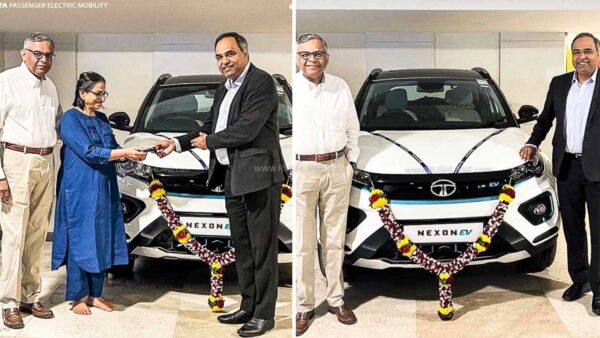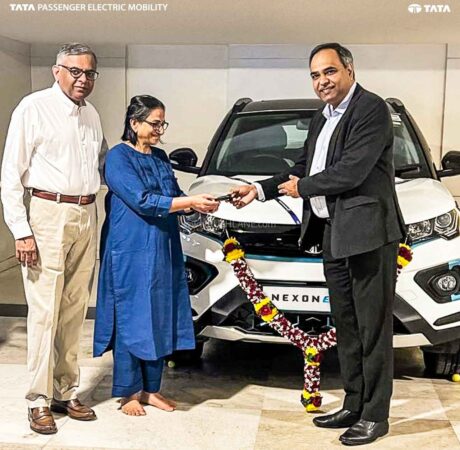Tata Nexon Electric car delivered to Tata Group Chairman, N. Chandrasekaran is the 50,000th EV from Tata Motors

With EV sales being noticeably higher through 2022, most companies are reporting growth. And some are posting new milestones. Where electric cars are concerned, the market isn’t bustling with activity. Because not all manufacturers offer an electric car yet. Some don’t sell a single electric car. On this front, Tata Motors has in a few short years grown its EV portfolio in a phased manner.
And before you can say Jack Robinson, Tata Motors has reached a significant milestone. The auto manufacturer has now delivered its 50,000th EV. And who better, that to Tata Group Chairman, N. Chandrasekaran.
Tata Nexon EV sales
Of this, a majority contribution is attributed to Tata Nexon EV. Sales for which had surpassed the 35k unit mark at the start of the month. Tata Motors is yet to launch an electric car built from the ground up. For now, it has done well to maximise the reach of its current portfolio by introducing electric variants in a timely fashion.
Nexon EV has nothing to prove and dominates as the top selling EV in India. Tata Tigor EV too has been available for a few years now. Most recently, Tata Tiago EV was launched. This has allowed the manufacturer to build its EV portfolio across segments, and price points. It’s smaller car Punch will soon be seen in its electric avatar, with a launch expected later in 2023.

For now, Tata Motors is advancing leaps and bounds in the EV segment. And while growing its EV network, it continues to reach newer domestic markets to make electric cars a part of the personal mobility ecosystem.
As far as the electric car segment is concerned, there hasn’t been any major announcement from most manufacturers. And this paints a picture of what to expect, and what not to expect in the near future. Tata Tiago EV, the manufacturer’s most recent launch has already garnered 20k bookings. And deliveries are scheduled to get underway in January 2023.
Electric cars expected to be at 30 percent by 2030
In supporting electric mobility, government goals are focused on public transport advancements. Here too, Tata has been setting trends. This apart, in recent months, a range of new manufacturers have embraced the electric scooter market. E-commerce companies are focused on small electric CVs to complete deliveries. And electric rickshaws too have soared ahead, depending on the city.
Where passenger cars are concerned, most conversations these days revolve around Tata Motors’ offerings. With the electric car market in India expected to grow noticeably by the turn of the decade, this is a space that should be closely competed in the years to come. EV sales penetration for passenger cars is expected at 30 percent by 2030.

